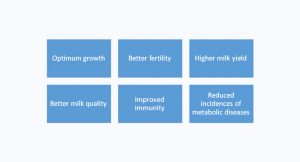 Feb 1,2020
Feb 1,2020

Vitamins are required in dairy animals to ensure health and productivity of the animal.
Water soluble vitamins are synthesized in rumen by microbes whereas fat soluble vitamins have to be supplemented from outside.
Supplementation of Vitamin A, D and E in dairy animals is crucial for their health and performance.Supply of these vitamins through normal feed and fodder is limited and often insufficient for high yielding animals.
Vitamin A is the most commonly deficient vitamin in cattle. It exists as β-carotene in green forages, which is precursor of this vitamin. Duringstorage, concentration of β-carotene decreases with time leading to low levels of dietary β-carotene which necessitates its supplementation.
Vitamin A is important for maintaining mucosal cell integrity which is first defense against invading pathogens. According to Yang et al, 2011 deficiency ofVitamin A damages both humoral and cellular immunity in the mucosa. Modulation of dendritic cells is likely an important mechanism through which Vitamin A deficiency affects mucosal immune responses against infection.
The liver is the storage organ for Vitamin A. Calves, when born, have low body stores of Vitamin A and they depend on colostrum for Vitamin A.
• Delayed sexual maturity/poor growth
• Suppressed immunity
• Abortions
• Still birth
• Retention of placenta
• Metritis
Vitamin D is required for calcium and phosphorus metabolism.It stimulates active transport of calcium and phosphorus at intestinal epithelium level.It maintains Ca homeostasis by increasing intestinal Ca absorption and by regulating Ca metabolism in bone. Vitamin D is also required for mineralization of the bone matrix. It also helps in mobilization of calcium from bone to the extracellular fluid.
When the level of calcium is low, parathyroid hormone (PTH) indirectly stimulates intestinal calcium absorption by stimulating production of 1,25-(OH)2D3. According to studies, 1,25-(OH)2D3 is transferred to the nucleus of the intestinal cell, where it interacts with the chromatin material subsequently leading to formation of specific proteins by ribosomes, which enhances Ca & P absorption.
• Anestrus
• Milk fever
• Metritis
• Retained Placenta
Vitamin E is present in fresh forages but its level degrades during periods of storage. Nutritionists suggest that all high yielding dairy animals have to be supplemented with Vitamin E to meet their specific requirements.
Vitamin E is primarily an anti-oxidant whichprotects cellular membranes from oxidative damage. Vitamin E maintains the structure and function of all muscles and is essential for the immune system.
• Nutritional myopathy in young calves
• Retained placenta
• Increased susceptibility to mastitis
